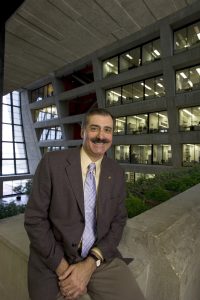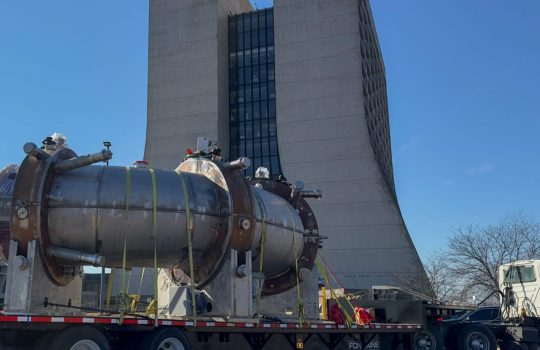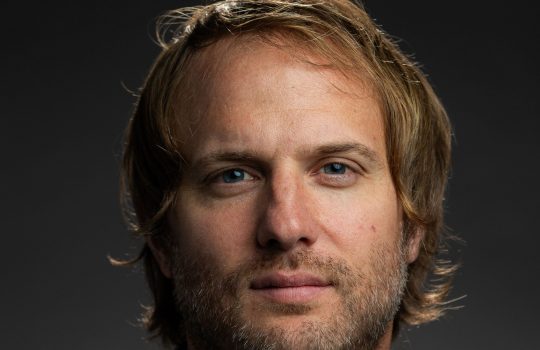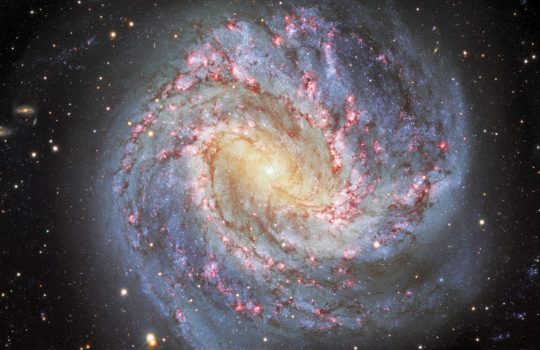BATAVIA, Illinois – Michael S. Witherell, Director of the U.S. Department of Energy’s Fermi National Acceleratory Laboratory, today (Nov. 1) announced the establishment of the Fermilab Particle Astrophysics Center, and named the renowned Fermilab and University of Chicago cosmologist Edward “Rocky” Kolb as its director.
“Astrophysics efforts began at our lab with the very successful Theoretical Astrophysics Group, and Rocky Kolb was a big part of establishing that tradition here,” Witherell said. “Rocky is well known and well respected in the larger world of astrophysics outside Fermilab, so he was the obvious choice to get things started with the Center for Particle Astrophysics.”
The Center will function as an intellectual focus for particle astrophysics efforts at the world’s highest-energy particle physics lab, bringing together the Theoretical and Experimental Astrophysics Groups. It will also encompass existing projects, including the Sloan Digital Sky Survey, the Pierre Auger Cosmic Ray Observatory, and the Cryogenic Dark Matter Search, as well as proposed projects, including the SuperNova Acceleration Probe to study dark energy as part of the Joint Dark Energy Mission, and the Dark Energy Survey, where Fermilab is building a camera for the Cerro Tololo Interamerican Observatory (CTIO) in Chile.
New data have revealed that only five percent of the universe is made of normal, visible matter described by the Standard Model. Ninety-five percent of the universe consists of dark matter and dark energy whose fundamental nature is a mystery. To reconstruct the cosmic story, telescopes and space probes detect the relics from the early universe, and particle accelerators recreate and study the extreme physics that characterized the stages of development and the transitions between them. Astrophysical observations of the relics of the big bang must agree with data from physics experiments recreating the particles and forces of the early universe. The two ends of the exploration-cosmology and particle physics-must meet.
“Like 16th century astronomers who suddenly faced the proposition of a heliocentric solar system, physicists are now eager to explore what may be a second Copernican revolution,” said Dr. Raymond L. Orbach, Director of the DOE Office of Science. “The growing and compelling confluence between cosmology and particle physics will play a crucial role in that quest. There could not be a better time to establish the Fermilab Particle Astrophysics Center, and we are delighted that Rocky Kolb has agreed to be its first Director.”
Michael Turner, Assistant Director for Mathematical and Physical Sciences at the National Science Foundation, reinforced Orbach’s support.
“Fermilab could not have chosen a better individual to lead this new center,” said Turner, who founded the Theoretical Astrophysics Group at Fermilab with Kolb in the 1970s. “Rocky is one of the pioneers in bringing together particle physics with cosmology. It was the Astrophysics Group at Fermilab that he and I worked together to establish that really cemented this connection. But he did all the work, and you can quote me on that.”
Following his appointment, Kolb announced that the Center for Particle Astrophysics will also support a graduate student for a year of work and study at Fermilab. The Brinson Pre-Doctoral Fellowship will be funded by The Brinson Foundation of Chicago, whose interests in scientific research include the areas of astrophysics and cosmology as well as geophysics and medical research. The Brinson Foundation lists Chicago’s Adler Planetarium among its many annual grants.
“We could not be more pleased to establish a relationship with this intriguing new effort in particle astrophysics at Fermilab,” said Gary Brinson, founder of the Chicago philanthropic organization. “The Brinson Fellowship reflects two of our core beliefs: that education is essential to the human mind and spirit and provides the basis for people to reach their full potential; and that advances in science and technology can be harnessed to materially improve the human condition. We offer our best wishes to Fermilab, to Rocky Kolb, and to the students who will lead the advances of the future.”
The Fellowship will be offered to students in the final year of their doctoral studies, who would work alongside a member of a Fermilab project. Kolb noted that, while Fermilab is not specifically an educational institution, the opportunity to train “the stars of the future” in particle astrophysics is invaluable.
“Particle cosmology is a reasonably new field,” he said. “Establishing this world-class center means we can attract future leaders with the chance to further their career and their education, and to have an impact on the field for many years to come. We will advertise world-wide, with the goal of attracting the best graduate students-and then, attracting the best doctoral students.”
Kolb, author of “BLIND WATCHERS OF THE SKY: The People and Ideas that Shaped Our View of the Universe,” also hopes the center can attract funding from private and non-governmental organizations. Astronomy has a long history of alternative funding, while particle physics remains primarily government-funded. Fermilab’s Theoretical Astrophysics Group is also funded by the National Aeronautics and Space Administration (NASA).
The Particle Astrophysics Center will celebrate its founding with a series of activities in the first week of December, including a Colloquium presentation on Wednesday, Dec. 8 by Michael Turner; a public lecture on Friday, Dec. 10 by 2002 Nobel Laureate Riccardo Giacconi, a founder of X-ray astronomy and builder of the first X-ray telescope; and a workshop, Fundamental Physics in Clusters of Galaxies, expected to attract more than 100 participants.
Fermilab is a DOE Office of Science national laboratory, operated under contract by Universities Research Association, Inc.




